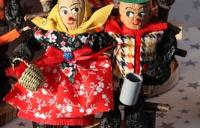期中英语试题及答案

篇1:期中英语试题及答案
第一卷(选择题共105分)
第一部分听力(共两节,满分20分)
第一节:(共5小题;每小题1分,满分5分)
听下面5段对话。每段对话后有一个小题,从题中所给的A、B、C三个选项中选出佳选项,并标在试卷的相应位置。听每段对话前,你将有时间阅读各个小题,每小题5秒钟;听完后,各小题将给出5秒钟的作答时间。每段对话读一遍。
1.WhatisBobinterestedinaboutthebook?
A.Thephotos.B.Theideas.C.Thedata.
2.Wheredoestheconversationtakeplace?
A.Inahotel.B.Onabus.C.Atacinema.
3.Whatdoesthewomanwanttodo?
A.Buyaticket.B.Parkhercar.C.Waitherturn.
4.WhathasBilldone?
A.Forgottenhispromise.
B.Failedtofinishhiswork.
C.Repeatedhiscarelessness.
5.Whichplacedoesthemanliketolivein?
A.Aquietplace.B.Alonelyplace.C.Anoisyplace.
第二节(共15小题;每小题1分,满分15分)
听下面5段对话或独白。每段对话或独白后有几个小题,从题中所给的A、B、C三个选项中选出佳选项,并标在试卷的相应位置。听完每段对话或独白前,你将有时间阅读各个小题,每小题5秒钟;听完后,各小题将给出5秒钟的做答时间。每段对话或独白读两遍。
听第6段材料,回答第6至7题。
6.Whatdoesthemanteachthewomantodo?
A.Writeherreport.B.Usehercomputer.C.Cleanherroom.
7.Howdoesthewomanfeelintheend?
A.Worried.B.Confused.C.Relaxed.
听第7段材料,回答第8至第9题。
8.What’sthelegalspeedlimit?
A.25milesperhour.B.65milesperhour.C.90milesperhour.
9.Whataccountedfortheman’sbehavior?
A.Notfocusingondriving.
B.Notbeinggoodatdriving.
C.Notknowingtheregulations.
听第8段材料,回答第10至第12题。
10.Whatdidthemanthinkofthecloningofhumans?
A.Acceptable.B.Impossible.C.Unbearable.
11.Whyarescientistsstudyingcloningatpresent?
A.Toreproduceawholehumanbeing.
B.Toseehowthecopylooksandacts.
C.Toreplacedamagedpartsofabody.
12.Howdidthewomangettoknowaboutthewaytomakenewmedicines?
A.Fromamagazine.
B.Fromsomescientists.
C.Fromthemanspeaker.
听第9段材料,回答第13至第16题。
13.Howdidthemanfindthemovietheysawlastweek?
A.Absurd.B.Boring.C.Excellent.
14.Whydoesthemanwanttoseeactionmoviesinatheatre?
A.Toenjoythemonabigscreen.
B.Toenjoythemwithmanyothers.
C.Tohavepopcornfordinnerthere.
15.Whicharethewoman’sfavourite?
A.Seafoodandchicken.
B.Meatandlovestories.
C.Fishandactionmovies.
16.Whatisthetalkmainlyabout?
A.Theirpastexperience.
B.Theirlikesanddislikes.
C.Theirplanforthenight.
听第10段材料,回答第17至第20题。
17.Whatdoesthespeakerencourageustodo?
A.Raiseanimals.B.Loseweight.C.Eathealthy.
18.Whatdowelearnaboutpeopleinearliertimesfromthespeaker?
A.Freefromworryaboutbadeffectoffood.
B.Busyproducingfoodforothers.
C.Richinvariousfood.
19.Whydosomepeoplegiveupeatingpotatoesorrice?
A.Tostaywell.
B.Tokeepslim.
C.Toeatright.
20.Howshouldwecontrolourweight?
A.Byhavingabalanceddiet.
B.Byhavingthesamediet.
C.Bydietingandexercising.
第二部分:英语知识运用(共二节,满分45分)
第一节:单项填空(共15小题;每小题1分,满分15分)
21.Iwillneverforgetmyteacher’sadvice:“Aslongasyoucanaffect______lifeofyourchildinanactiveway,youhavebeen_____success”.
A./;theB.a;/C.a;theD.the;a
22.Hemusthavegoneout.Iheardthedoor____whenIwasstillinbed.
A.tolockB.lockingC.beinglockedD.havinglocked
23.---Ihavestudiedgrowingplantsasoneofmyinterests.ShallImakesomesuggestion?
---______.
A.GorightaheadB.Youwillmakeit.C.Don’tmentionit.D.Takeiteasy.
24.Well,thereddresswillmakeyou_____inthecrowd.
A.sortoutB.stickoutC.comeoutD.standout
25.Suchgoodusehadbeenhissparetime_____hisEnglishhasimprovedalot.
A.madeof;asB.madeof;thatC.madein;thatD.foundin;as
26.Ididn’tseeyoursisteratthemeeting.Ifshe_____,shewouldhavemetmybrother.
A.hascomeB.didcomeC.cameD.hadcome
27.Theneedtofindasolution______himon.Heworkedevenharder.
A.appointB.motivateC.urgedD.evaluate
28.Thetraditionalfriendshipbetweenourtwopeoples______ancienttimes.
A.isdatedbacktoB.datesatC.datesbacktoD.isdatedfrom
29.---Theshoescostmealmost300yuan.
---Well,itwascrazyofyoutospendsomuchmoney_____youcouldbuyamuchcheaperone.
A.whileB.ifC.becauseD.when
30.His_____oftoomuchtimetosportsleavestoolittletimetostudy.
A.anxietyB.tensionC.devotionD.thirst
31.Somecyclistsmakethe_____thattrafficlawsdonot_____them.Itisnottrue,______.
A.assumption;applyto;thoughB.thought;applyto;however
C.assuming;applyfor;thoughD.idea;applyfor;however
32.TherewasnothingspecialabouthistraveltoXian,itwasonly_____.
A.particularB.curiousC.averageD.mistaken
33.---God!Thevaseisbroken.Whodidit?
---______
A.It’sclear.B.Don’tlookatme.C.Nevermind.D.Whoareyouasking?
34.Manypeoplethinklittleofme,butIdidwhat______.
A.IthoughtIwasrightB.Ithoughtitwasright
C.IthoughtwasrightD.Iwasthoughtright
35.---Don’tyouagreewithwhathesaidatthemeeting?
---Yes,______.Itcan’tbebetter.
A.approximatelyB.absolutelyC.probablyD.extremely
B.Beforelong,sheletmesittherebymyself.
C.Iendedmysellingwitharecordamountofcosmetics.
D.TodayIstillcarrythatlessonwithme:Ilistentocustomers.
E.Mygrandma’strusttaughtmehowtohandleresponsibility.
F.SoonIfoundmyselflookingmorebeautifulthaneverbefore.
G.WatchingmymoneygrowwasmorerewardingthananythingIcouldhavebought.
第二卷(共45分)
第一节单词拼写(共10小题;每小题1分,满分10分)
根据下列句子所给汉语意思,写出空缺处各单词的正确形式。
76.Asthewageswerelow,therewerefew______(申请人)forthejob.
77.Somepeople______(反对)thatthenewtaxlawwasunfair.
78.Aburdenbecomeslightestwhenitiswell______(承担)
79.Brodyreachedintothe______(冰箱)andpulledoutabeer.
80.Hecleanedhishandsinthecoldwaterfromthe______(自来水).
81.______(分类)bysubject,thebooksinthelibraryareingoodorder.
82.Sheisdeterminedtodo______(不顾)ofallconsequences.
83.Thechildrenwere______(着迷的)bythetoysintheshopwindow.
84.Theboyhasn’tbeen______(撕扯)awayfromthetelevisioneversincehewokeupthismorning
85.Allareadmitted,without______(参考)toageorsex.
第二节:句子翻译(共5分)
86.Whenyougetinside,youwillseemany______(满是关于不同学科的书籍的架子)。
87.SichuanProvince______(富有旅游胜地)andenjoysmanyworld-famousplacesofinterest,suchasJiuzhaigouandDujiangyanIrrigationProject.
88.Someothershavejusttheoppositeopinion.Theythinkthattheycan______(从原著获得更多的详细信息).
89.Firstly,______(因为我们缺少足够的练习),wearelosingthebeautyofhand-writtenChinesewordswhichexpressthewriterbetterwhilemachinewordsallhavethesamelooks.
90.However,thememberofstudentswhoenjoyreadingpopularsciencearticles______(是那些人数目的两倍)whopreferreadingarticlesaboutlearningmethods.
第三节:短文改错(共10小题,每小题1分,满分10分)
英语课上,老师要求同桌同学相互修改作文。假设以下短文为你同桌所写,请你对其进行修改。文中共有10处错误,每句中多有两处。错误涉及一个单词的增加、删除或修改。
增加:在缺词处加一个漏词符号∧,并在此符号下面写出该加的词。
删除:把多余的词用斜线\划掉。
修改:在错词下面划一横线,并在该词下面写出修改后的词。
注意:1、每处错误及其修改均仅限一词;
2、只允许修改10处,多者从第11处不计分。
Awolflefthishomeoneeveningonfinespiritsandwithanexcellentappetite.Asheran,thesettingsuncasthisshadowfaroutontheground.Itlooksasifthewolfwereahundredtimebiggerthanhereallydid.Thewolfsaidproudly,“SeeinghowbigIam!ItiscertainlythatIcanbeatatinylion!I’llshowhimwhoisfittobeKing,heorme.”Justthenahugeshadowcoveredhimentirely,andnextmomentalionstrikehimdownwithasingleblow.Donotletyourimaginationtomakeyouforgetrealities.
第四节:书面表达(满分20分)
个人习惯在人们的日常生活中起着重要作用。请根据下列要点写一篇短文,并在后谈谈你的看法。
1.良好的个人习惯对自己,他人及社会有利。
2.不良的个人习惯使人生厌。
3.个人习惯直接关系着公共健康,不好的习惯会导致一些传染疾病的传播。
注意;
1.对所给要点进行陈述,要作适当发挥,不要简单翻译。
2.词数120左右。文章的开始已给出,不计入总词数。
60.Whowouldmisshisorherfamilymost?
A.JaimeB.JayneC.MikoD.Paola.
61.Whichofthefollowingpeoplewouldfeelmostuncomfortablewithoutthenewsmedia?
A.Steve.B.JaimeC.Roger.D.Tomas
62.Howmanyofthemmentionedthattheywouldmissfoodordrink?
A.OneB.TwoC.ThreeD.Four
C
NOTallmemoriesaresweet.Somepeoplespendalltheirlivestryingtoforgetbadexperiences.Violenceandtrafficaccidentscanleavepeoplewithterriblephysicalandemotionalscars.Oftentheyrelievetheseexperiencesinnightmares.
NowAmericanresearchersthinktheyareclosetodevelopingapill,whichwillhelppeopleforgetbadmemories.Thepillisdesignedtobetakenimmediatelyafterafrighteningexperience.Theyhopeitmightreduce,orpossiblywipeout,theeffectofpainfulmemories.
InNovember,expertstestedadrugonpeopleintheUSandFrance.Thedrugstopsthebodyreleasingchemicalsthatfixmemoriesinthebrain.Sofartheresearchhassuggestedthatonlytheemotionaleffectsofmemoriesmaybereduced,notthatthememoriesarewipedout.Theyarenotsuretowhatdegreepeople’smemoriesareaffected.
Theresearchhascausedagreatdealofargument.Somethinkitisabadidea,whileotherssupportit.
Supporterssayitcouldleadtopillsthatpreventortreatsoldiers'troublingmemoriesafterwar.Theysaythattherearemanypeoplewhosufferfromterriblememories."Somememoriescanruinpeople'slives.Theycomebacktoyouwhenyoudon'twanttohavetheminadaydreamornightmare.Theyusuallycomewithverypainfulemotions,"saidRogerPitman,aprofessorofpsychiatryatHarvardMedicalSchool."Thiscouldrelievealotofthatsuffering."
Butthosewhoareagainsttheresearchsaythatmaybethepillscanchangepeople’smemoriesandchangingmemoriesisverydangerousbecausememoriesgiveusouridentity.Theyalsohelpusallavoidthemistakesofthepast.
"Allofuscanthinkofbadeventsinourlivesthatwereterribleatthetimebutmakeuswhoweare.I'mnotsurewewanttowipethosememoriesout,"saidRebeccaDresser,amedicalethicist.
63.Thepassageismainlyabout.
A.anewmedicalinvention
B.anewresearchonthepill
C.awayofwipingoutpainfulmemories
D.anargumentabouttheresearchonthepill
64.Wecanknowfromthepassagethat.
A.peopledoubttheeffectsofthepills
B.thepillwillcertainlystoppeople'semotionalmemories
C.takingthepillwilldoharmtopeople'sphysicalhealth
D.thepillhasalreadybeenproducedandusedbythepublicinAmerica
65.WhichofthefollowingdoesRebeccaDresseragreewithinthelastparagraph?
A.somememoriescanruinpeople'slives.
B.peoplewanttogetridofbadmemories.
C.experiencingbadeventsmakesusdifferentfromothers.
D.thepillwillreducepeople'ssufferingsfrombadmemories.
66.Youmayprobablyreadthepassagein__________
A.aguidebookB.atextbook
C.amedicalmagazineD.asciencefiction
D
Somepeoplemakeyoufeelcomfortablewhentheyarearound.Youspendanhourwiththemandfeelasifyouhaveknownthemhalfyourlife.Thesepeoplehavesomethingincommon.Andonceweknowwhatitis,wecantrytodoitourselves.
Howisitdone?Hereareseveralskillsthatgoodtalkershave.Ifyoufollowtheskills,they’llhelpyouputpeopleattheirease,andmakefriendswiththemquickly.
Firstofall,goodtalkersaskquestions.Almostanyone,nomatterhowshyheis,willansweraquestion.Onewell-knownbusinesswomansays,“Atbusinesslunches,Ialwaysaskpeoplewhattheydidthatmorning.It’sacommonquestion,butitwillgetthingsgoing.”Fromthereyoucanmoveontoothermatters—sometimestoreallypersonalquestions.Andhowheanswerswillletyouknowhowfaryoucango.
Second,oncegoodtalkershaveaskedquestions,theylistentotheanswers.Thispointseemsclear,butitisn’t.Yourquestionsshouldhaveapointandhelptotellwhatsortofpersonyouaretalkingto.Andtofindout,youreallyhavetolistencarefullyandattentively.
Reallisteningatleastmeanssomethings.Firstitmeansnottochangethesubjectofconversation.Ifsomeonestickstoonetopic,youcantakeitasafactthathe’sreallyinterestedinit.Reallisteningalsomeansnotjustlisteningtowords,buttotonesofvoice.Ifthevoicesoundsdull,then,it’stimeforyoutochangethesubject.
Finally,goodtalkersknowwellhowtodealwiththeoccasionofparting.Ifyou’resayinggood-bye,youmaygivehimafirmhandshakeandsay,“I’vereallyenjoyedmeetingyou.”Ifyouwanttoseethatpersonagain,don’tkeepitasecret.Letpeopleknowwhatyoufeel,andtheymaywalkawayfeelingasifthey’veknownyouhalftheirlife.
67.Askingquestionsmightbeaquitegoodandsuitableway_______.
A.foryoutomakemoreandmorenewfriends
B.tobeginyourbusinesstalks
C.togettheconversationgoingsmoothly
D.foryoutomakeadeepandlastingimpressiononothers
68.Afterhavingaskedsomebodyaquestion,it’llbepoliteofyouto_______.
A.makeclearwhatkindofpersonheis
B.listentohisreplyattentively
C.waitquietlyandpatientlyforhisanswer
D.goonaskinghimmorequestions
69.Generallyspeaking,goodtalkersarepersonswho_______.
A.aregoodatmakinganytopicinteresting
B.nevertalktoomuchortoolittle
C.alwaysspeakinagentleway
D.knowhowandwhentheyshouldchangethetopicofthetalk
70.Ifyoureallytakedelightinmeetingsomeoneagain,_______.
A.youmaytakehimasyourlifelongtrustworthyfriend
B.itseemsnecessaryforyoutolethimknowit
C.it’sproperforyoutogivehimasecondhandshake
D.it’llbehelpfulforyoutohavefurtherunderstandingofhim
E
根据短文内容,从短文后的选项中选出能填入空白处的佳选项,选项中有两项为多余选项。
IwastenwhenIfirstsatwithmygrandmotherbehindthecashierinhergeneralstore.71Iquicklylearnedtheimportanceoftreatingcustomerspolitelyandsaying“thankyou.”
AtfirstIwaspaidincandy.72Iworkedeverydayafterschool,andduringthesummerandonweekendsandholidaysfrom8a.m.to7p.m.Myfatherhelpedmesetupabankaccount.73
BythetimeIwas12,mygrandmotherthoughtIhaddonesuchagoodjobthatshepromotedmetosellingcosmetics(化妆品).Idevelopedtheabilitytolookcustomersdirectlyintheeye.EventhoughIwasjustakid,womenwouldaskmesuchthingsas“WhatcolordoyouthinkIshouldwear?”Itookarealinterestintheirquestionsandwasabletotranslatewhattheywantedintomakeupideas.74
Thejobtaughtmeavaluablelesson:tobeasuccessfulsalesperson,youdidn’tneedtobearocketscientist---youneededtobeagreatlistener.75Iexpecttheyarenolongerwomenpurchasingcosmeticsfromme;instead,theyarekidswhotellmewhichtoystheywouldliketoseedesignedanddeveloped.
A.LaterIreceived50centsanhour.
B.Beforelong,sheletmesittherebymyself.
C.Iendedmysellingwitharecordamountofcosmetics.
D.TodayIstillcarrythatlessonwithme:Ilistentocustomers.
E.Mygrandma’strusttaughtmehowtohandleresponsibility.
F.SoonIfoundmyselflookingmorebeautifulthaneverbefore.
G.WatchingmymoneygrowwasmorerewardingthananythingIcouldhavebought.
第二卷(共45分)
第一节单词拼写(共10小题;每小题1分,满分10分)
根据下列句子所给汉语意思,写出空缺处各单词的正确形式。
76.Asthewageswerelow,therewerefew______(申请人)forthejob.
77.Somepeople______(反对)thatthenewtaxlawwasunfair.
78.Aburdenbecomeslightestwhenitiswell______(承担)
79.Brodyreachedintothe______(冰箱)andpulledoutabeer.
80.Hecleanedhishandsinthecoldwaterfromthe______(自来水).
81.______(分类)bysubject,thebooksinthelibraryareingoodorder.
82.Sheisdeterminedtodo______(不顾)ofallconsequences.
83.Thechildrenwere______(着迷的)bythetoysintheshopwindow.
84.Theboyhasn’tbeen______(撕扯)awayfromthetelevisioneversincehewokeupthismorning
85.Allareadmitted,without______(参考)toageorsex.
第二节:句子翻译(共5分)
86.Whenyougetinside,youwillseemany______(满是关于不同学科的书籍的架子)。
87.SichuanProvince______(富有旅游胜地)andenjoysmanyworld-famousplacesofinterest,suchasJiuzhaigouandDujiangyanIrrigationProject.
88.Someothershavejusttheoppositeopinion.Theythinkthattheycan______(从原著获得更多的详细信息).
89.Firstly,______(因为我们缺少足够的练习),wearelosingthebeautyofhand-writtenChinesewordswhichexpressthewriterbetterwhilemachinewordsallhavethesamelooks.
90.However,thememberofstudentswhoenjoyreadingpopularsciencearticles______(是那些人数目的两倍)whopreferreadingarticlesaboutlearningmethods.
第三节:短文改错(共10小题,每小题1分,满分10分)
英语课上,老师要求同桌同学相互修改作文。假设以下短文为你同桌所写,请你对其进行修改。文中共有10处错误,每句中多有两处。错误涉及一个单词的增加、删除或修改。
增加:在缺词处加一个漏词符号∧,并在此符号下面写出该加的词。
删除:把多余的词用斜线\划掉。
修改:在错词下面划一横线,并在该词下面写出修改后的词。
注意:1、每处错误及其修改均仅限一词;
2、只允许修改10处,多者从第11处不计分。
Awolflefthishomeoneeveningonfinespiritsandwithanexcellentappetite.Asheran,thesettingsuncasthisshadowfaroutontheground.Itlooksasifthewolfwereahundredtimebiggerthanhereallydid.Thewolfsaidproudly,“SeeinghowbigIam!ItiscertainlythatIcanbeatatinylion!I’llshowhimwhoisfittobeKing,heorme.”Justthenahugeshadowcoveredhimentirely,andnextmomentalionstrikehimdownwithasingleblow.Donotletyourimaginationtomakeyouforgetrealities.
第四节:书面表达(满分20分)
个人习惯在人们的日常生活中起着重要作用。请根据下列要点写一篇短文,并在后谈谈你的看法。
1.良好的个人习惯对自己,他人及社会有利。
2.不良的个人习惯使人生厌。
3.个人习惯直接关系着公共健康,不好的习惯会导致一些传染疾病的传播。
注意;
1.对所给要点进行陈述,要作适当发挥,不要简单翻译。
2.词数120左右。文章的开始已给出,不计入总词数。
听力: 1—5 CBBCA 6—10 BCBAC 11—15 CABAA 16—20 CCABA
单选:21.DCADB 26.DCCDC 31.ACBCB
完形:36~40 DCBAB41~45CADAD 46~50 CBBAC 51~55 DBABD
阅读:56-59 DACD 60-62 BCC 63-66 DACC 67-70 CBDB
七选五:71-75 BAGCD
单词拼写:76. applicants 77. objected/opposed 78. borne 79. refrigerator/fridge 80. tap 81. Classified 82. regardless 83. fascinated 84. torn 85. reference
句子翻译:
86.shelves full of books on different subjects
87.is rich in tourist attractions
88. get more detailed information from the original
89. as we lack enough practice
90. doubles that of those
短文改错:
A wolf left his home one evening on fine spirits and with an excellent appetite. As he ran, the setting sun cast his shadow far out on the ground. It looks as if the wolf were a hundred time bigger than he really did. The wolf said proudly, “Seeing how big I am! It is certainly that I can beat a tiny lion! I’ll show him who is fit to be King, he or me.” Just then a huge shadow covered him entirely, and ∧next moment a lion strike him down with a single blow. Do not let your imagination to make you forget realities.
参考范文:
Personal habits play an important role in our daily lives. Basically there are good habits and bad habits. For example, some people are addicted to drinking and smoking, while others pay special attention to healthy diet. Forming a good habit is beneficial to oneself, others and society as a whole, while a bad habit may make others feel sick.
It goes without saying that there is a close relationship between personal habits and public health. On the one hand, good habits are important to public health. On the other hand, bad habits may give rise to the spread of infectious disease.
Personally, I think it is high time we placed much stress on improving personal habits and public health. If we make great efforts to develop good habits, there will be a bright and encouraging future and we can live in a more harmonious society.
篇2:期中英语试题及答案
本试卷分第I卷(选择题)和第Ⅱ卷(非选择题)两部分,分别答在答题卡上(I卷)和答卷(Ⅱ卷)上,答在试卷上的答案无效。
第I卷 选择题(三部分,共11.5分)
第一部分:听力(共两节,满分30分)
第一节(共5小题;每小题1.5分,满分7.5分)
听下面5段对话。每段对话后有一个小题,从题中所给的A、B、C三个选项中选出选项。听完每段对话后,你都有10秒钟的时间来回答有关小题和阅读下一小题。每段对话仅读一遍。
1.When are they going to leave?
A.At 3:15. B.At 4:1 5. C.At 2:4 5.
2.How will the man go to Beijing?
A.By plane. B.By train. C.By car.
3.What does the woman suggest?
A.Put the telephone near the bed.
B.Catch a later flight.
C.Ask the hotel staff for help.
4.How many people went to the Great Wall?
A.Seven. B.Four. C.Five.
5.Who is familiar with Disney World?
A.The man. B.The woman.
C.The woman's grandmother.
第二节(共1 5小题,每小题1.5分,满分22.5分)
听下面5段对话或独白,每段对话或独白后有几个小题,从题中所给的A、B、C三个选项中选出选项,并标在试卷的相应位置。听每段对话或独白前,你将有时间阅读各个小题,每小题5秒钟;听完后,每小题将给出5秒钟的作答时间。每段对话或独白读两遍。
听第6段材料,回答第6至8题。
6.W here does this conversation most likely take place?
A.In a park. B.In a school. C.At a party.
7.Where did the girl grow up?
A.In England. B.In America. C.In France.
8.What does the girl's fat her do?
A.An inventor. B.A teacher. C.A doctor.
听第7段材料,回答第9至11题。
9.Who is the man?
A.An officer. B.A reporter. C.A fisherman.
10.Which areas are the most dangerous?
A.In the mountain.
B.In the centre of the capital.
C.Between the volcano and the sea.
11.How many people were killed by the eruption(火山爆发)?
A.None. B.Six thousand. C.Eleven thousand.
听第8段材料,回答第1 2至1 4题。
12.Who was Mrs.Stowe?
A.A writer. B.A slave. C.An actress.
13.What can we learn about the book?
A.It is hard to read. B.It is about the Civil War.
C.It is about the life of slaves in America.
14.What does the man want to do tonight?
A.Read the book. B.See a film. C.Buy a ticket.
听第9段材料,回答第15至17题。
15.What's the probable relationship between the two speakers?
A.Friends B.Strangers C.Boss and secretary.
16.What do we know about the pictures?
A.They were taken in China.
B.They were taken by the man
C.They were taken by the woman's?
17.What do we know about the woman?
A.She doesn't know Chinese. B.She doesn't like Chinese food.
C.She's got a lot of Chinese friends.
听第10段材料,回答第1 8至20题。
18.In which city did Elizabeth attend the medical school?
A.New York. B.Philadelphia. C.Paris.
19.What forced Elizabeth to give up being a surgeon(外科医生)?
A.An eye illness. B.Social pressure. C.Lack of money.
20.What was Elizabeth's contribution?
A.She set up the first hospital in the world.
B.She trained many experienced nurses.
C.She set up the first medical school for women.
第二部分:英语知识运用(共两节,满分45分)
第一节:单项填空(共1 5小题;每小题1分,满分1 5分)
从A、B、C、D四个选项中,选出可以填人空白处的选项。
21.The driver the traffic lights and nearly caused a traffic accident.
A.ignored B.checked C.disliked D.obeyed
22.-If our parents would listen more to us,they would understand us better.
- .I hey just expect us to listen to them.
A.I believe not B.No problem
C.Good idea D.I can't agree more
23.-Well put on the play but we can't find suitable clothes.
-Of course.Such clothes are out of now.
A.sight B.use C.date D.reach
24.It was some time we realized the truth.
A.when B.until C.since D.before
25.With more coal the fire,it kept burning for a long time.
A.added to B.added up C.adding to D.added up to
26.The MP3 he has been looking for is not he bought last week.
A.it B. one C.the one D.which
27. the day going on,you will find it more and more interesting and useful for
you to l earn a language.
A.With B. After C.While D.As
28.She met many famous actresses when in the film Hero.
A.act B.acts C.acted D.acting
29. it is to watch the live NBA game!
A.How fun B.What fun C.What a fun D.What funs
30.There are words in English that came from other languages.
A.a plenty of B.a great deal of
C.a great many D.a large number
31.Only when I left my parents for Britain how much I loved them.
A.did I realize B.I realized
C.had I realized D.I had realized
32.He from his seat and said that something must be done to people's living standards.
A.rose; raise B.rose; rise C.raised; raise D.raised; rise
33.Little Kate insisted she badly injured and to the hospital at once.
A.was;was sent B.be;be sent
C.was;be sent D.was;send
34.He has always been honest and straight forward,and it doesn't matter
he is talking to.
A. who it is B. who is it C. whom is it D.it is whom
35.I've bought all English dictionaries which you can if you meet new words.
A.get to B.come to C.refer to D.look up
篇3:期中英语试题及答案
本试卷分第一卷(选择题)和第二卷(非选择题)两部分,共150分,考试时间120分钟。
第I卷(三部分,共115分)
第一部分:听力(共两节,满分30分)
第一节(共5小题;每小题1.5分,满分7.5分)
听下面5段对话。每段对话后有一个小题。从题中所给的A、B、C三个选项中选出选项,并标在试卷的相应位置。听完每段对话后,你都有10秒钟的时间来回答有关小题和阅读下一小题。每段对话仅读一遍。
1. What dose the man like about the play?
A.The story B. The ending C. The actor
2.Which place are the speakers trying to find?
A.A hotel. B.A bank C.A restaurant.
3.At what time will the two speakers meet?
A.5:20. B.5:10. C.4:40.
4.What will the woman do?
A.Change the plan. B.Wait for a phone call. C.Sort things out.
5.What does the woman want to do?
A. See a film with the man. B. Offer the man some help. C.Listen to some great music.
第二节(共15小题:每小题1.5分,满分22.5分)
听下面5段对话,每段对话后有几个小题,从题中所给的A、B、C三个选项中选出选项,并标在试卷的相应位置。听每段对话前,你将有时间阅读各个小题,每小题5秒钟;听完后,各小题给出5秒钟的作答时间,每段对话读两遍。
听第6段材料,回答第6、7题。
6.Where is Ben?
A.In the kitchen. B.At school. C.In the park.
7.What will the children do in the afternoon?
A.Help set the table. B.Have a party C.Do their homework.
听第7段材料,回答8、9题。
8.What are the two speakers talking about?
A.A family holiday. B.A business trip. C.A travel plan.
9.Where did Rachel go?
A.Spain. B.Italy. C.China.
听第8段材料,回答第10至12题。
10.How did the woman get to know about third-hand smoke?
A.From young smokers. B.From a newspaper article. C.From some smoking parents.
11.Why does the man say that he should keep away from babies?
A.He’s just become a father. B.He wears dirty clothes . C.He is a smoker.
12.What does the woman suggest smoking parents should do?
A.Stop smoking completely.
B.Smoke only outside their houses.
C.Reduce dangerous matter in cigarettes.
听第9段材料,回答第13至16题。
13.Where does Michelle Ray come from?
A.A middle-sized city. B.A small town. C.A big city.
14.Which place would Michele Ray take her visitors to for shopping?
A.The Zen Garden. B. The Hightlands. C. The Red River Area.
15. What does Michelle Ray do for complete quiet?
A. Go camping. B. Study in a library. C. Read at home.
16. What are the speakers talking about in general?
A. Late night shopping. B. Asian food. C. Louisville.
听第10段材料,回答第17至20题。
17. Why do some people say they never have dreams according to Dr. Garfield ?
A. They forget about their dreams.
B. They don't want to tell the truth.
C. They have no bad experiences.
18. Why did Davis stop having dreams?
A. He got a serious heart attack.
B. He was too sad about his brother’s death.
C. He was frightened by a terrible dream.
19. What is Dr Garfield’s opinion about dreaming?
A. It is very useful.
B. It makes things worse.
C. It prevents the mind from working.
20.Why do some people turn off their dreams completely?
A. To sleep better.
B. To recover from illnesses.
C. To stay away from bad experience.
第二部分:英语知识运用(共两节,满分45分)
第一节:单项填空(共15小题;每小题1分,满分15分)
从A、B、C、D四个选项中,选出可以填入空白处的选项。
21. —Let’s have _______break.
—Didn’t we just have ______ now?
A. a; one B. one; that C. a; them D. a; it
22. —What’s the matter, Mary? You look _____________.
—My bag is lost, and my wallet is in it.
A. happy B. moved C. excited D. upset
23. The nursed tried to ___________ the little boy down by giving him some candies.
A. get B. look C. calm D. touch
24. —Could I use your computer for a few minutes, please?
— __________. I’m not using it myself.
A. Come on B. It depends C. Go ahead D. That’s great
25. Sam always pronounces my name wrong. Do you think he does it ____________?
A. on purpose B. at present C. at the end D. right away
26. Although I often send e-mails to Tom, I have never seen him _____________.
A. face to face B. in time C. at the moment D. hand in hand
27. John thinks it won’t be long ____________ he is ready for his new work.
A. when B. after C. before D. since
28. This is the first time that we ____________a film in the newly-built cinema together.
A. see B. had seen C. saw D. have seen
29. I don’t think she is a nice woman; I am __________her empty talk.
A. grateful for B. tired of C. interested in D. concerned about
30. His story is _________his own experience when he was studying in America.
A. based in B. based on C. basing on D. basing in
31. A lot of problems _______at the meeting, which made things worse.
A. came across B. came on C. came up D. came in
32. Though they hadn’t seen each other for many years, they _______each other at first sight.
A. realized B. recognized C. regretted D. knew
33. The police asked him to _________what he had seen.
A. set about B. set down C. set up D. set out
34. —Good evening. ?
—Yes, that’s right. We’d like this table on the side.
A.What for B.Can I help you
C.What’s the matter D.Two for dinner
35. We shouldn’t ignore what happens it is difficult for us to accept some stories.
A.as if B.seeing that C.on condition that D.even if[来源
第二节:完形填空(共20小题;每小题1.5分,满分30分)
阅读下面短文,掌握其大意,然后从36-55各题所给的四个选项A、B、C和D中,选出选项,并填在答题卡上。
When someone takes shoes to a shop to be mended, he is given a ticket with a number on it. Then, 36 his shoes are ready, he goes back to the shop, gives the ticket to the shoemaker, gets his shoes and 37 for them.
One day Mrs. Smith gave her husband a 38 of her shoes which needed mending and asked him to 39 them to the shop. Mr. Smith did so, and put the 40 for them in his pocket.
He went back four days 41 to get the shoes, 42 when he went into the shop, he was not able to find his ticket 43 ,and the shoemaker did not want to give him the 44 until he got the ticket.
“How do I know that the shoes are 45 unless you give me the ticket?” he said. “If I give them to you now, somebody 46 may come into my shop with the ticket tomorrow, and then I shall not be able to give him the shoes.”
Mrs. Smith needed the shoes very much, so her husband 47 for a moment and then went out to his 48 , which was at the side of the road 49 the shop. He 50 the door, and whistled(耳语)to his wife’s small 51 , which was sitting on the back seat. Then he went back into the shop and 52 it, “Get the shoes!” The dog began to 53 around the shop, and soon it found Mrs. Smith’s shoes and brought them to Mr. Smith one after the 54 .
“That should prove(证明)that they are my wife’s.” Mr. Smith said.
The shoemaker 55 and then he gave the shoes to Mr. Smith.
36.A.before B. when C. since D. unless
37.A.cares B. looks C. pays D. waits
38.A. pair B. set C. kind D. piece
39.A. show B. change C. lead D. take
40.A. bill(帐单) B. paper C. ticket D. list
41.A.late B. later C. ago D. long
42.A.but B. because C. and D. or
43.A.everywhere B. anywhere C. nowhere D. somewhere
44.A. return B. idea C. shoes D. answer
45.A.what B. whose C. where D. yours
46.A.else B. some C. every D. all
47.A.worried B. cried C. thought D. hoped
48.A. train B. bus C. boat D. car
49.A.inside B. outside C. up D. round
50.A.opened B. closed C. broke D. built
51.A.clock B. dog C. cat D. hen
52.A.said to B. replied C. answered D. talked
53.A.hear B. taste C. smell D. see
54.A. each B. once C. any D. other
55.A.surprised B. frightened C. cried out D. laughed
第三部分:阅读(共两节,满分40分)
第一节 (共15小题,每题2分,满分30分)
阅读下列短文,从每题所给的四个选项(A、B、C和D)中,选出选项,并在答题卡上将该项涂黑。
A
Some British and American people like to invite friends for a meal at home. You should not be upset if your English friends don’t invite you home. It doesn’t mean they don’t like you!
Dinner parties usually start between 7 p.m. and 8 p.m. and end at about 11 p.m. Ask your host(主人)what time you should arrive. It’s polite to bring flowers, chocolates or a bottle of wine as a gift.
Do you want to show that you are polite? Then you can say how much you like the room, or the pictures on the wall. But remember—it’s not polite to ask how much things cost.
In many families, the husband sits at one end of the table and the wife sits at the other side. They eat with their guests.
You’ll probably start the meal with soup or something small, then you’ll have meat or fish with vegetables, and then dessert(甜点心), followed by coffee. It’s polite to finish everything on your plate and to take more if you want .
Whether you enjoy the evening or not, you should call your hosts the next day, or write them a short “Thank you” letter. British and American people like to say “Thank you, thank you, thank you” all the time!
56. If an English friend doesn’t invite you to his or her dinner, it .
A. means he or she doesn’t like you
B. means he or she likes you
C. doesn’t mean he or she likes you
D. doesn’t mean he or she doesn’t like you
57. If you are going to attend a dinner party, .
A. you’d better bring a certain present with you
B. you must leave home for it at 7 p.m.
C. you should ask your host what to bring as a gift
D. you must arrive before 7 p.m.
58. It’s impolite .
A. to say that you like the host’s room very much
B. for a guest to ask the host the price of the things in the room
C. for a guest to have drinks and snacks before the evening.
D. for the host and the hostess to sit and eat with their guests
59. In which order will you eat or drink the following things at a meal?
A. Snacks, vegetables, meat, coffee.
B. Coffee, drinks, soup, fish, vegetables, dessert.
C. Soup, meat with vegetables, dessert and coffee.
D. Drinks, soup, something small, fish and vegetables.
B
“If you want to see something well, reach out and touch it!”
That may seem a strange thing to say. But touching things can help you to see them better.
Your eyes can tell you that a glass ball is round. But by holding it in your hands, you can feel how smooth and cool the ball is. You can feel how heavy the glass is.
When you feel all these about the ball, you really see it.
With your skin, you can feel better. For example, your fingers can tell the difference between two coins in your pockets. You can feel a little drop of water on the back of your hand, too.
You can even feel sounds against your skin. Have you ever wanted to know why some people like very loud music? They must like to feel the sounds of music.
All children soon learn what “Don’t touch!” means. They hear it often. Yet most of us keep on touching things as we grow up. In shops, we often have to touch things before we buy them.
The bottoms of our feet can feel things, too. You know this when you walk on warm sand, cool grass or a hard floor. All feel different under your feet.
There are ways of learning to see well by feeling. One way is to close your eyes and try to feel everything that is touching your skin. Feel the shoes on your feet, the clothes on your body, the air on your skin.
Most museums are just for looking. But today some museums have some things to touch. Their sings say, “Do touch!” There you can feel everything on show.
60. By touching things .
A. you will have a strange feeling B. you will learn how to reach out
C. you can see things better D. you can tell what colors they are
61. Which of the following can be the best title of the story?
A. Touching by Feeling B. To See or to Feel
C. To See Better—Feel D. Ways of Feeling
62. When people buy things in shops, they often .
A. try them on first B. put their right hand on them
C. just have a look D. feel and touch them
C
On the wall in my mother’s bedroom there was a photo, which showed a soldier with a gun. Below the photo was the word “Speaking”.
“Who’s that soldier called Speaking?” I asked one day.
“He was Harold.” She said. “He was my only brother. When the Second World War began, Harold was eighteen. I was twelve then, and my sisters were ten and nine”.
“Harold liked to play with us, and we often quarreled. When we quarreled, we said:We’re not speaking to you. But before long we were all happy again, and then we said: I’m speaking now. Are you speaking to me?”
“When the war broke out, Harold joined the army. A month later, he came to see us. He brought the gun to show us. Then he went miles away to the war. We didn’t see him for three years, three long, empty years. We didn’t often hear from him. But one day in May there was a loud bang(砰)on the front door…”
“I ran to open it. It was Harold! He was an old Harold, a thinner Harold. He looked at me with his two green eyes and smiled. That smile was just the same as before, then he said one word: ‘speaking’”.
“I didn’t…I couldn’t…answer. I just fell into his arms and he dropped his gun. He stayed with us for a month. We played all our old games again. Then he went back to the war, and never came back again. So I wrote the word on the photo.”
63. How old was the storyteller when Harold came back for the last time?
A. Thirty-five B. Eighteen. C. Fifteen. D. Twenty-one.
64. When Harold came back home .
A. he changed a lot except for his eyes and smile
B. he made a shoot in front of the door
C. his sister could hardly recognize him
D. his sister had another quarrel with him
65. Harold never came back again because .
A. he didn’t want to speak to his sister any more
B. he died in the war
C. his sister had not answered him when he came back
D. he went far away to the war
66. Why did the mother hang the photo in her bedroom?
A. She wanted to keep a memory of her childhood.
B. It could awake her happy memories.
C. It could show that her brother was a great man.
D. She hung it there in memory of her brother.
D
Sport is full of wonderful moments, but maybe nothing is as exciting as the marathon, which is the longest, hardest race of all. The name comes from a small village in Greece, where a famous battle happened in 490 B.C. When the Greeks won, a soldier ran over 40 kilometres from Marathon to Athens to tell people the good news. When the modern Olympic Games were held in 1896, the organizers knew the story. The marathon has been a race since then.
The Olympic Games are held every four years. The best players in the world, or at least the best “amateurs”, are collected in one place. An amateur is someone who does not earn money from sport. It is often difficult to say who is an amateur and who is not. It is true that Olympic athletes do not earn large amounts of money like professional sportsmen. But Olympic athletes are often students or teachers of a sport. They have to spend much time training. Their governments pay for their training travel and pocket money, because they want them to win. Some people think this changes the Olympics. They feel that the Games are now a political marathon.
67. How long has the marathon been a race in the Olympics?
A. For over 100 years. B. For less than 100 years.
C. For half a century. D. For thousands of years.
68. The professional players are those who .
A. pay money for training B. earn money from sports
C. are the same as the amateurs D. work for the government
69. Who often take part in the Games as Olympic athletes?
A. All the amateurs of a sport. B. Students or teachers of a sport.
C. Every professional sportsman. D. The winners of the Olympics.
70. Why do the governments pay the Olympic athletes?
A. The athletes are training hard. B. It is the governments’ duty.
C. The athletes are wanted to win. D. The athletes don’t earn money from sports.
第二节(共5小题;每小题2分,共10分)
根据短文内容,从短文后的七个选项中选出能填入空白处的选项。选项中有两项为多余选项。
It’s not just women who wear skirts. 71 In Scotland, men wear a kind of skirt called kilt. The kilt is their national dress and an important part of their tradition.
A kilt is a colored skirt reaching down to the knees. It has checks(格子)on it with different colors, like red and blue. 72
73 There are many stories about it. One story is that kilt was invented in the 1720s by an English factory owner, Thomas Rawlinson.
Thomas Rawlinson had a number of Scottish workers in his factory and he thought their clothing got in the way of their work. 74
Today, most Scotsmen look the kilt as formal dress. They usually only wear them at wending or big dinner. 75
A. Each family in Scotland has it’s own colors.
B. There are only a few men who still wear a kilt every day.
C. How did the Scots start to wear skirts ?
D. It was important for Scots to wear skirts at any time.
E. So he cut their long clothes into shorter skirts.
F. Wearing skirts is very beautiful for women.
G. Men can wear them, too.
请将71—75题答案写在第二卷非选择题答题纸上相应位置
第II卷 非选择题(共35分)
71._______ 72.________ 73._________ 74._________ 75.__________
第四部分: 写作(共两节, 满分35分)
第一节:短文改错 (共10分,每小题1分,满分10分)
该文中共有十处错误,每句中最多有两处,错误涉及一个单词的增加、删除或修改。
增加:在缺词处加一个漏字符号(∧), 并在此符号下面写出该加的词。
删除:把多余的词用斜线( \)划掉。
修改:在错的词下划一横线, 并在该词下面写出修改后的词。
注意:1、每处错误及其修改均仅限一词;
2、只允许修改十处, 多者(从第11处起) 不计分。
Dear Li Mei,
With the mid-term exam come, you must get prepared for them.I think that you need is a right study method.As we all know, there are three stage in study— preview, study in class and review, among which review was the most important.You should first make a review plan, and then stick to it.I follow my review plan strictly and have made a progress in my study.It turns out to be good enough.Of course, there are more than one way to review.So long as you review regular, I’m sure you can find more ways to study well.If you have any question of subjects, you may ask me I’m glad to help you.We may meet in our school library every Friday afternoon.
Yours,
Li Hua
第二节:书面表达(满分25分)
假设你是Tom, 是一名高一新生。请你给自己的初中同学Jack写一封信,简要介绍自己的高中生活。
要点:
1)已经适应了高中的生活,并且交了好多朋友。
1) 非常想念过去的老师和同学们;与现在的同学相处很好,对老师很满意。
2) 自己一定努力学习,为的是三年以后能够上个好的大学。
注意:1)数80左右2)头和结尾已为你写好,不计入总词数
Dear Jack,
______________________________________________________________________________
Yours,
Tom
高一英语试题答案
听力(每小题1.5分,满分30分)
1—5 CABBA 6—10 CBACB 11—15 CAABC 16—20 CABAC
单选(每小题1分,满分15分)
21—25 ADCCA 26—30 ACDBB 31—35 CBBDD
完形(每小题1.5分,满分30分)
36—40 BCADC 41—45 BABCD 46—50 ACDBA 51—55 BACDD
阅读(每小题2分,满分40分)
56—59 DABC 60—63CCDC 64—67ABDA 68—70BBC
改错(每小题1分,满分10分)
Dear Li Mei,
With the mid-term exam come (coming), you must get prepared for them (it). I think that (what) you need is a right study method. As we all know, there are three stage (stages) in study--- preview, study in class and review, among which review was (is) the most important. You should first make a review plan, and then stick to it. I follow my review plan strictly and have made a(删掉a) progress in my study. It turns out to be good enough. Of course, there are (is) more than one way to review. So long as you review regular (regularly), I’m sure you can find more ways to study well. If you have any question of (about) subjects, you may ask me (∧and)I’m glad to help you. We may meet in our school library every Friday afternoon.
Best regards.
Yours,
Li Hua



